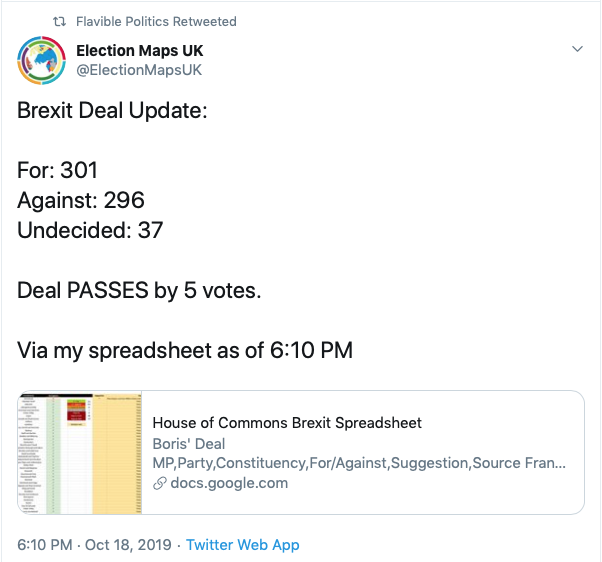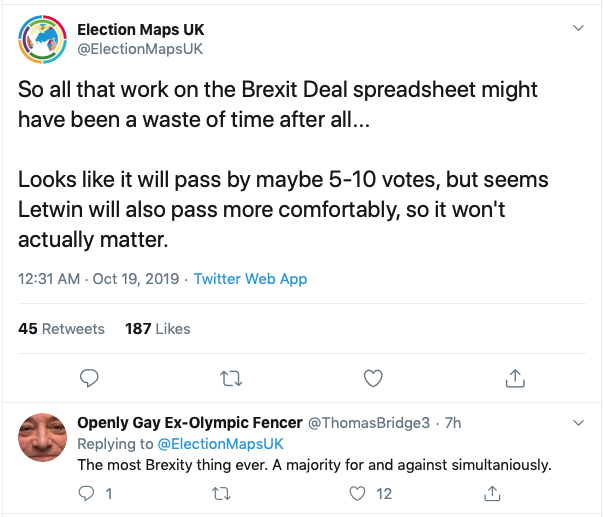Mandatory Brexit “Super Saturday” Post

A couple nights ago, Boris Johnson negotiated a new withdrawal agreement with the European Union. One thing needs to be made clear — this is not a trade deal, this is not a final arrangement, it’s simply the framework for an initial divorce agreement. And it may pass. Or not.
The Economist is complimentary about neither Johnson’s negotiating prowess nor the initial economic impact of the deal. On the former: “Mr Johnson got to this point chiefly by making concessions. . . Although he insists that Northern Ireland will still legally be part of UK customs territory, the effect of this concession is to turn what was a backstop for the whole country into a form of frontstop for Northern Ireland alone.” And on the latter: “According to estimates this week from the UK in a Changing Europe, an academic think-tank, over ten years Mr Johnson’s deal will reduce British income per person by 6.4% compared with what it would otherwise be, whereas Mrs May’s would reduce it by 4.9%—a difference of £500 per head.”
OK, it’s bad. But then, any withdrawal from the European Union will be economically sub-optimal. We know this, we’re screwed, and it’s boring. However, as implied above, it will keep Northern Ireland in a customs union with the Republic of Ireland (ergo, the EU) thus, effectively, impose a customs border through the Irish Sea, separating Northern Ireland from Great Britain. In the words of Jon Tonge:
A vote in favour of Boris Johnson’s Brexit deal will fundamentally reshape Northern Ireland’s place in the UK, in economic terms at least. The Northern Irish economy will be, in terms of rules at least, as closely aligned to the rest of Ireland and the EU. A border poll would at some point follow to seek constitutional as well as economic unification.
Credit to the Democratic Unionist Party (words I never thought I’d write in that order) for remaining ideologically consistent in rejecting this deal (assuming, of course, they do indeed vote against): they know it will only serve to nudge NI, ultimately, into a union with the Republic. Johnson essentially betrayed his allies in the DUP, and they’re not pleased.
Right. So, does it pass tonight, on what is being hyped as “Super Saturday”, given it’s the first sitting of Parliament on a Saturday since the Falklands War? This is anyone’s guess, but while the Economist article linked above is pessimistic, the mood over the past 12 hours has been steadily in the direction of passage.

Of course, with Brexit, nothing can be simple. It’s also looking likely that this thing called the Letwin Amendment will also pass. It tacitly approves of the Brexit deal, but not in a manner sufficient to legally satisfy the Benn Act, thus necessitating another extension to withdrawal (which at present is scheduled, suitably, for Halloween). Election Maps UK (thread here) implies that this amendment renders the the vote on the Withdrawal Agreement itself moot:

But that is also not entirely clear. Stephen Bush in the New Statesman suggests that the Government has a range of options in how to play the Letwin Amendment:
But the government could react to losing the Letwin vote by declaring the neutral motion an indicative one, declaring victory or defeat as necessary and either moving onto its Brexit deal passing or its “Brexit’s great under the Conservatives, don’t let Jeremy Corbyn block or delay it” general election campaign.
I simply don’t believe that, given that Boris Johnson has actually negotiated a Brexit deal that it will be a significant event in the life of the country if it becomes legally operational on 4 November rather than 31 October, not least because we will be in a standstill transition anyway. Given that he tried to suspend Parliament, lied to the Queen and double-crossed the DUP to get a deal, I am thoroughly unconvinced that the line that he has gone soft on Brexit is going to land in an election even if that election takes place while we are still EU members, so I see no reason why the government wouldn’t just declare victory and trundle on.
I think that gets us up to speed . . .


